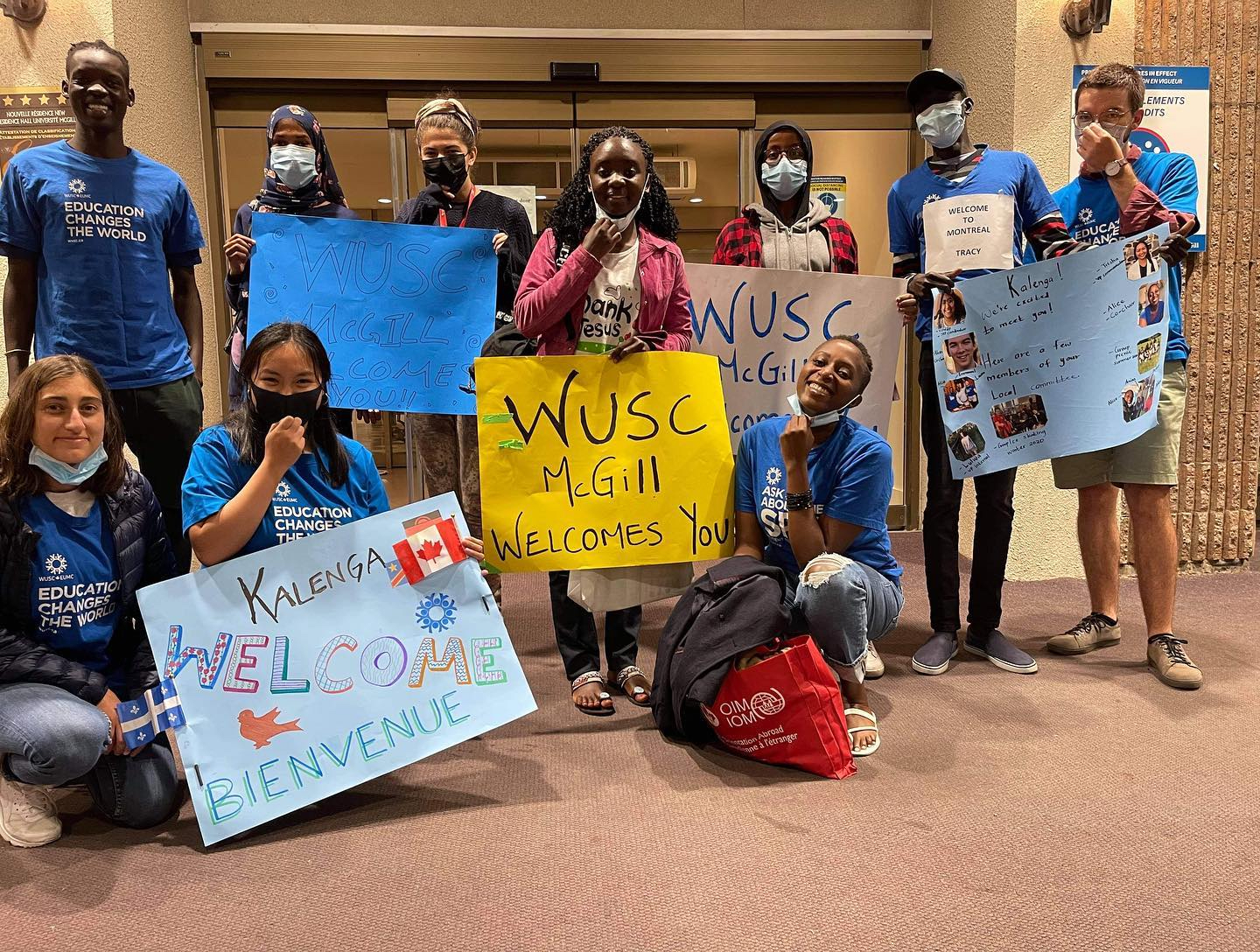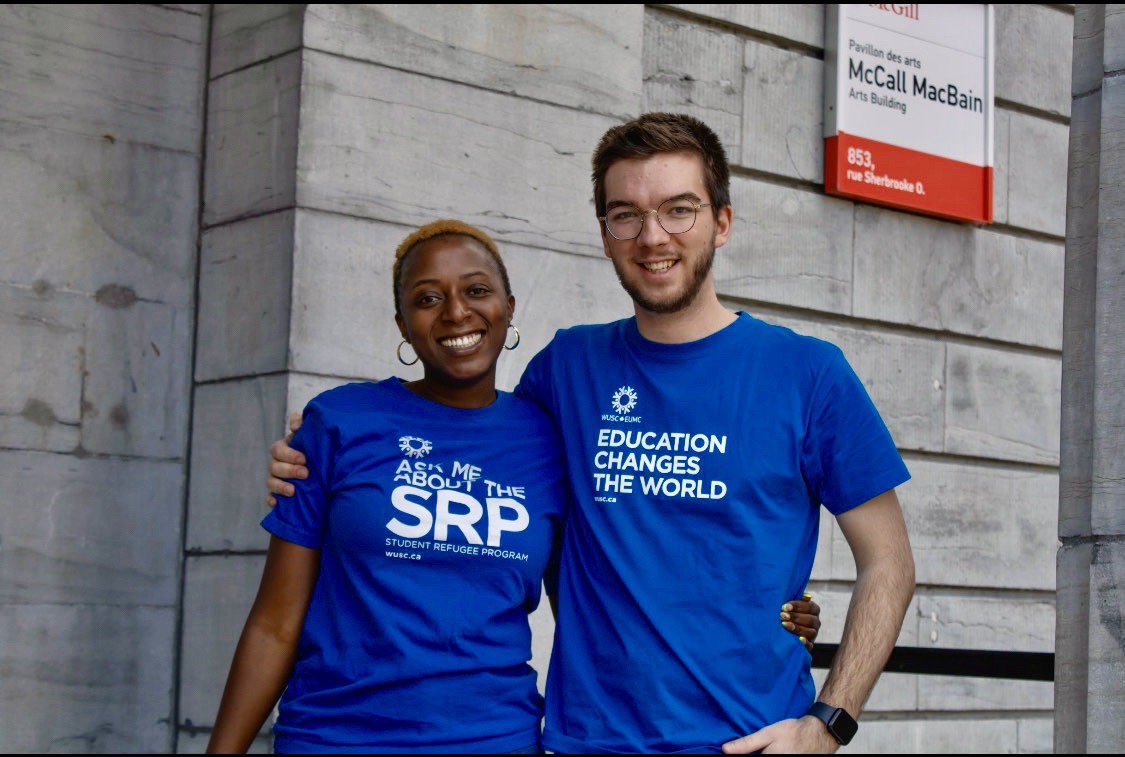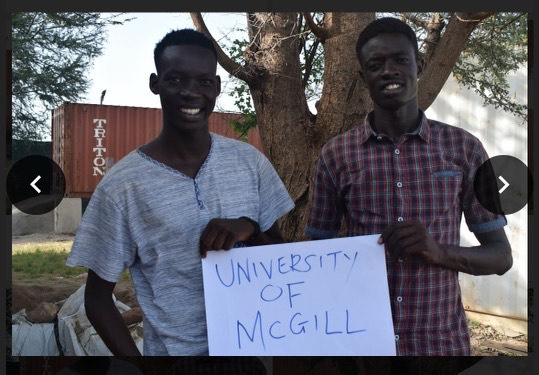
According to the United Nations High Commissioner for Refugees’ most recent report, the number of people forced to flee conflict, violence, human rights violations and persecution has now surpassed 100 million for the first time on record. Of that number, over 26 million are refugees, another tragic milestone.
Millions of lives derailed, countless dreams and aspirations shattered. But not all hope is lost.
On May 30, Manyang Lual Jok accepted his BA in Computer Science and Economics, just five years removed from the Kakuma Refugee Camp in Kenya, where he had spent more than half his life.
Jok is the most recent success story of the WUSC McGill Student Refugee Program. Since its establishment in 1986, WUSC McGill has sponsored 60 student refugees to resettle in Canada and pursue their education at McGill. Currently, 13 WUSC scholars are pursuing their studies at McGill. WUSC McGill is in full preparation to welcome eight new scholars this fall, including, for the first time, two Afghan scholars. This is WUSC McGill’s largest cohort to date.
Run by students, funded by students
It is a program unlike most others.
WUSC McGill is student-run club of the Students’ Society of McGill University that provides a year of full financial sponsorship, integration assistance, and a community of support. The program is funded through a $4 levy collected from all McGill students every semester based on student referendum, which is administered by the Scholarships & Student Aid Office.
“The SRP is unique because this peer-to-peer resettlement is not the regular pathway that the government uses to resettle refugees,” says Alice Ishimwe, WUSC McGill’s Student Refugee Program Cordinator. “I’ve been invited to speak in other countries and they don’t have programs like this where youth are doing what organizations and governments usually do.”
Five pillars
WUSC McGill is a branch of the World University Service of Canada, a non-profit organization that fosters youth-centered solutions for improved education, economic, and empowerment opportunities to overcome inequality and exclusion in countries across Asia, Africa and the Americas.
WUSC Student Refugee Program Local Committees operate on five pillars. Academic integration; social integration; health and well-being; financial support; and self-reliance. WUSC works with over 100 Canadian universities, colleges, and CEGEPs to bring scholars to Canada.
Full financial and social support

“Many of the USC scholars arrive with a backpack with little more than pictures from home,” says Ishimwe, who just earned her Bachelor of Social Work from McGill and will start her Masters of Social Work in the fall. “The financial support includes everything from housing (they usually stay in Residence), tuition, books, laptops, phones, winter clothing – even McGill swag.”
But the support goes well beyond finances. WUSC McGill is literally there the moment the new scholars set foot in Montreal. “We meet each new arrival at the airport, everyone holding welcome signs and wearing our blue WUSC t-shirts,” says Ishimwe. “It is definitely the most exciting time for all of us.”
“Usually, they don’t know anything about WUSC McGill or even McGill itself,” she says. “Sometimes all they know is that they are going to Canada – they don’t know what province, what city, or what campus.”
“We take them to the residence and start mobilizing,” she says. “Campus tours, meet their professors and academic advisors – all before classes start.”
A taste of home
Alone in a new country and apart from their friends and family many new arrivals are overwhelmed. To ease the transition, WUSC McGill organizes social activities (skating, bowling, picnics.); and ensures each scholar has a phone or laptop to be able to communicate with people back home.
“It’s a huge culture shock – even when it comes to food” says Ishimwe. “In their first few days here, we find people who can prepare traditional meals from their home countries – be it Kenya, Malawi, Burundi, Lebanon, Syrians, South Sudan, or Somalia. It is all part of the acclimatization.”
“We feel like this is the best model for us to integrate peers because it’s not someone in an office telling them what to do,” she says. “It’s your colleague who’s going to classes with you, eating at the cafeteria with you, shopping with you for a winter jacket. There’s no big power imbalance.”
Quick learners
Ishimwe is quick to point out that, while simple things that we take for granted – like paying a phone bill – can be confusing for new scholars at first, it doesn’t take long before they start to blossom.
“Don’t forget, they have gone through a very competitive selection process to part of the WUSC program. These are very skilled students who were selected from the top schools of their camps,” she says. “After a few months they joke about their confusion over the first few days – because now they are experts in navigating McGill and Montreal.”
“And because they are curious, many of them travel within Canada to get a better understanding of the country. It is beautiful to see.”
Rethinking the way we view refugees
Ishimwe says that, while WUSC undoubtedly saves lives, we sometimes lose sight of the reciprocal benefits. She notes that WUSC “graduates” are spread around the world – from working for Microsoft in Seattle and Pinterest in San Francisco, to working for Immigration Canada and UNESCO in the UK.
“People should think of WUSC as a way to bring talented people here,” she says. “These scholars are brilliant and they add to the diversity of McGill and Canada with the richness of their intellect and of their cultures. We’re all better for it.”
Learn more about WUSC McGill and how you can get involved.
______
Snapshot of a WUSC scholar
Name:
Gattuoch Kuon
Program of study:
Computer Science and Psychology
Where were you born?
I was born and raised in South Sudan.
Tell us about your life prior to becoming a part of the WUSC program.
In 2007, I moved to Kakuma Refugee Camp in Kenya with my uncle’s family because I left my family back in South Sudan. I started my primary education in 2007, and in 2013, after being among the best students in Kakuma Refugee Camp, I was one the 10 students awarded UNHCR High School Scholarship. In 2016, I sat for my Kenya Certificate of Secondary Education (KCSE) where I secured WUSC scholarship to study at McGill University in 2017.
How has the WUSC program changed your life?

Through WUSC, I was able fulfil one of my dreams of studying abroad in the program I love. I have been able to get various internship opportunities as a Software Engineer intern at BMO Financial Group (Winter 2021), Nordstrom (Summer 2021), Nvidia (Fall 2021).
I was invited to participate in Software Engineering skill building programs by Google (Winter 2020) and Uber (winter 2021), and now I will be going back to Nordstrom for another internship (summer 2022).
I’m also leading a non-profit called I Stretch My Hand that give high school scholarship opportunities to bright but financially unstable kids from my community in Kakuma Refugee Camp, where I grew up.
Through WUSC I met other WUSC scholars from my community who support I Stretch My Hand and give back to our community. Apart from these, I’m able to support my family and sibling’s education in Kenya.
All of this was made possible through the life-changing opportunity that WUSC gave me in 2017 at McGill University.
What are your plans after graduation?
I plan to find a tech job as a software engineer and grow my career for a while before I can think of doing a Master’s or an MBA depending on what area of expertise In Tech I want to pursue. I also plan to grow I Stretch My Hand to a position of sustainability so that we can help more kids apart from the five scholars I Stretch My Hand currently supports.
